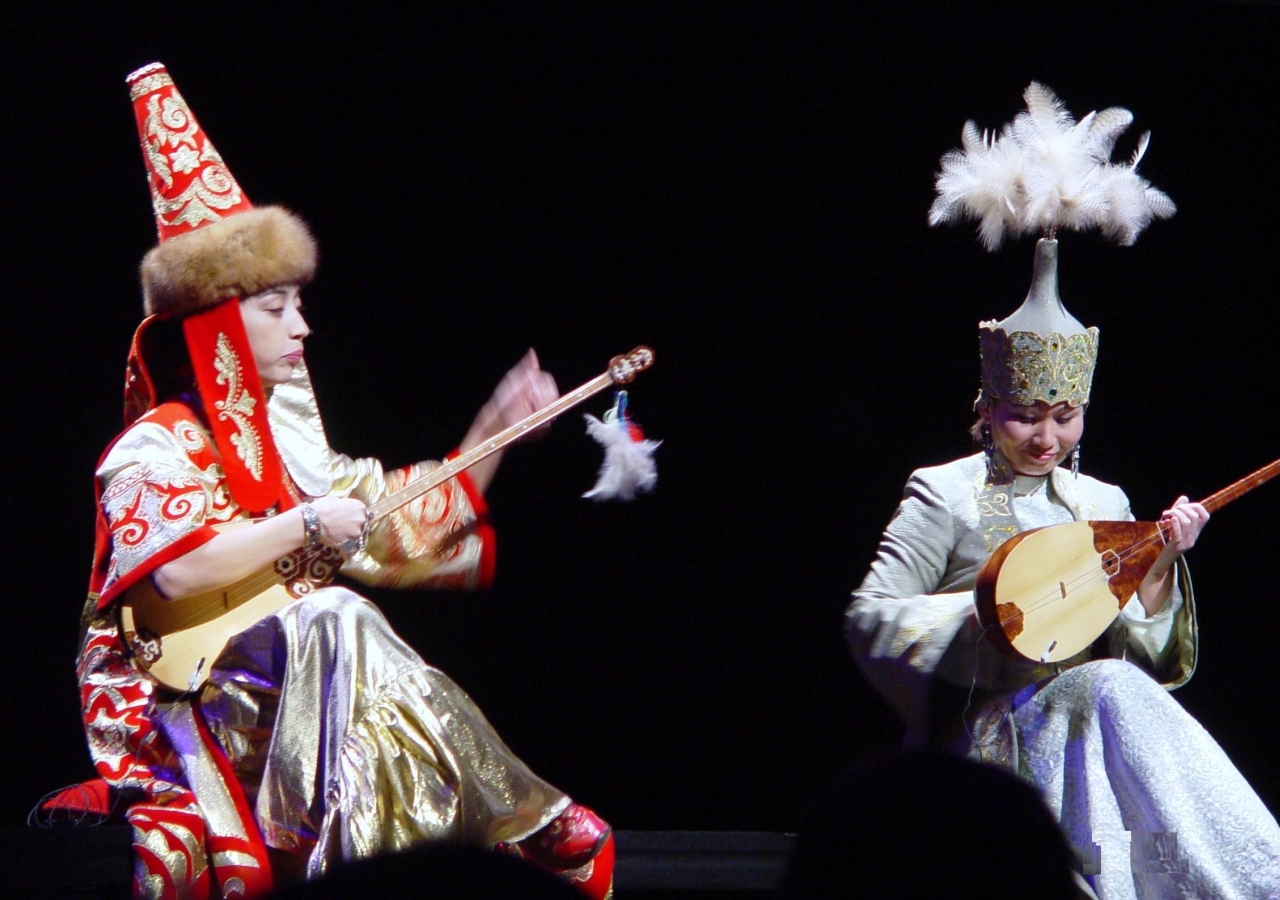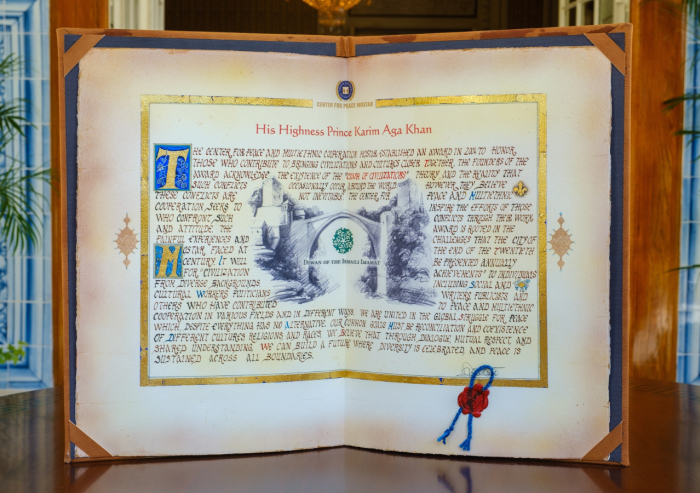 Father Alexei Smith, Director of the Office of Ecumenical and Interreligious Affairs for the Archdiocese of Los Angeles, with Mohammed Abdul Aleem, CEO, Islamicity.com, at the reception following the concert hosted by the Ismaili Council for the Western United States at the University of California, Los Angeles. Photo: Farhez Rayani
Father Alexei Smith, Director of the Office of Ecumenical and Interreligious Affairs for the Archdiocese of Los Angeles, with Mohammed Abdul Aleem, CEO, Islamicity.com, at the reception following the concert hosted by the Ismaili Council for the Western United States at the University of California, Los Angeles. Photo: Farhez RayaniAudiences in the United States, both Jamati and external, were fortunate to experience the extraordinary devotional traditions of poetry, music and dance indigenous to Central Asia. A concert tour entitled, “Spiritual Sounds of Central Asia: Nomads, Mystics and Troubadours,” enthralled audiences at its opening performance at Harvard University, in October 2007, and subsequently in ten other cities across the country.
Co-produced by the Aga Khan Music Initiative in Central Asia (AKMICA) and the World Music Institute, the concert featured traditional music by renowned singers from Tajikistan and Azerbaijan that expressed the devotional dimension of their cultures, linked by the common thread of Persian mystical poetry. Among the wellsprings of such poetry are Jalaluddin Rumi, the most widely-read poet in the United States, as well as Hafiz and Nasir Khusraw. The concert also featured pre-Islamic epic poetry from Kazakhstan, once recited amongst the nomadic peoples of the Turkic steppes. For many in the audience, it was their first encounter with Central Asian spiritually-inspired music, and an unforgettable, edifying experience.
The Badakhshan Ensemble, a group of Ismaili musicians from Tajikistan, performed moving renditions of their devotional songs and music, through which audiences could visualise life in the majestic Pamir mountains near the river Pyanj, which forms the diaphanous boundary between Tajikistan and Afghanistan. Their repertoire included songs commonly performed at weddings, as well as the more serious spiritual poetry known as maddoh, songs of mystical love and praise. Exotic instruments, such as the daf (drum), the Pamiri rubab (lute) and the ancient ghijak (spike fiddle) infused the air with rhythms and cadences that were unfamiliar at first but soon had the audience tapping their fingers and toes to the musical beat.
 The Badakhshan Ensemble of Tajikistan infused the air with exotic rhythms and cadences using the daf (drum), the Pamiri rubab (lute) and the ancient ghijak (spike fiddle) Photo: Mehmood Panjwani
The Badakhshan Ensemble of Tajikistan infused the air with exotic rhythms and cadences using the daf (drum), the Pamiri rubab (lute) and the ancient ghijak (spike fiddle) Photo: Mehmood PanjwaniThe influence and role of traditional music in Central Asia was affected by its political history. Fairouz Nishanova, Director of AKMICA, noted that over time, much of the “musical heritage was destroyed or tampered with, leaving the region's cultural memory, religious spirit, and age-old traditions weakened.” However, with AKMICA's support for new schools of music, a group of exceptional musicians, bearing the traditions of their forefathers, are revitalising important musical repertoires throughout Central Asia and passing on their heritage to students in Afghanistan, Kazakhstan, Kyrgyzstan, Tajikistan, and Uzbekistan. “We are particularly interested now in creating fusion music. Previously this was not an option, as Central Asian musicians were not comfortable enough in their own musical styles to collaborate with others,” notes Fairouz. Watching AKMICA's vision come to life at New York's Carnegie Hall, Agshin Mehdiyev, Ambassador and Permanent Resident of Azerbaijan to the United Nations, commented that this is “the best way to restore self trust, self understanding, and to present the culture of our people…to the outside world.”
 Children from the Los Angeles area Jamat outside Santa Monica Jamatkhana, listening to the Badakhshan Ensemble conducting a lecture-demonstration Photo: Farhez Rayani
Children from the Los Angeles area Jamat outside Santa Monica Jamatkhana, listening to the Badakhshan Ensemble conducting a lecture-demonstration Photo: Farhez RayaniAudiences were impressed with the range of musical genres, instruments, vocal talent and rhythms. The spiritual atmosphere that the concert evoked, allowed many to discover how deeply music is embedded in the devotional expression of many Muslim cultures. Ali Asani, Professor of the Practice of Indo-Muslim Languages and Culture at Harvard University, reflected: "This definitely surpassed my expectations. Central Asia is always seen as an exotic other, and through the recitation of poetry this show humanises the whole civilisation. Love is universal and there was love in the poetry, which speaks across cultures."
 Ulzhan Baibussynova and Ardak Issataeva play the dombra and sing traditional Kazakh songs Photo: Mehmood Panjwani
Ulzhan Baibussynova and Ardak Issataeva play the dombra and sing traditional Kazakh songs Photo: Mehmood PanjwaniVerses from the ancient Talim (didactic song from Kazakhstan), included lines such as, “When you are thirsty, water tastes like honey,” and “Tasty food is most interesting just before it is eaten,” eliciting nods of agreement and laughter from the audience. The two accomplished singers, Ulzhan Baibussynova and Ardak Issataeva illustrated how female musicians have captivated their listeners and thrived in what was once an exclusively male vocal tradition.
Alim Qasimov, a musical icon in Azerbaijan who was awarded the IMC-UNESCO International Music Prize in 1999, and his daughter Fargana, were the final singers, accompanied by virtuoso musicians. Their compositions, while significantly different in arrangement and tempo from the other artists, reiterated the use of music as a spiritual tool, inherent in each of these traditions.
 Award-winner Alim Qasimov, his daugther Fargana Qasimov and Natiq Shirinov of Azerbaijan Photo: Mehmood Panjwani
Award-winner Alim Qasimov, his daugther Fargana Qasimov and Natiq Shirinov of Azerbaijan Photo: Mehmood PanjwaniAKMICA consultant and curator of the tour, Theodore Levin, a Professor of Music at Dartmouth College, New Hampshire, explained that "International touring helps musicians in Central Asia to address one of the principal artistic challenges of our time: how to nourish global connections while retaining a link to art rooted in a sense of place and tradition." AKMICA efforts to introduce the West to the music of Central Asia have been lauded, most recently by Travel+Leisure Magazine which awarded the Spiritual Sounds of Central Asia with an honourable mention in their Global Vision Awards for 2007 for “setting up music schools throughout the region and supporting a worldwide touring program,” as exemplary initiatives in helping to preserve Central Asian culture.
AKMICA, a program of the Aga Khan Trust for Culture, aims to sustain and further develop Central Asia's musical heritage by ensuring its transmission to a new generation of artists and audiences through teaching, performance, documentation, and mediated dissemination, both within the region and beyond its borders. Its program activities are shaped by the vital role of music and musicians in the cultures of the Muslim world, where music has historically served as a means of expressing social identity, preserving spiritual practices and beliefs, and transmitting poetry, history, philosophy and ethics.
The work of the artists who comprised the “Spiritual Sounds of Central Asia: Nomads, Mystics and Troubadours” can be found on Volumes Four to Six of the Music of Central Asia, CD and DVD series,








